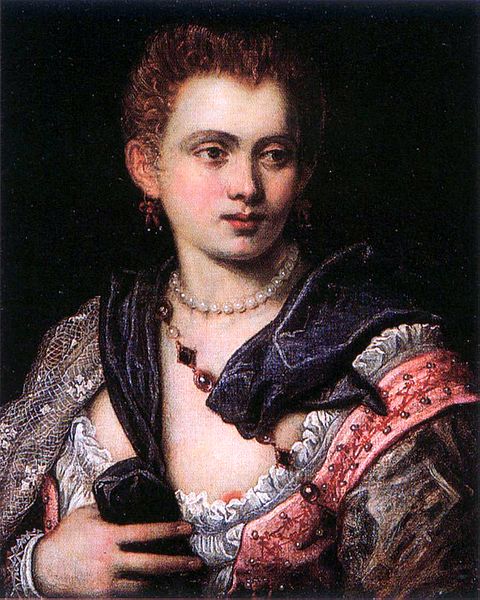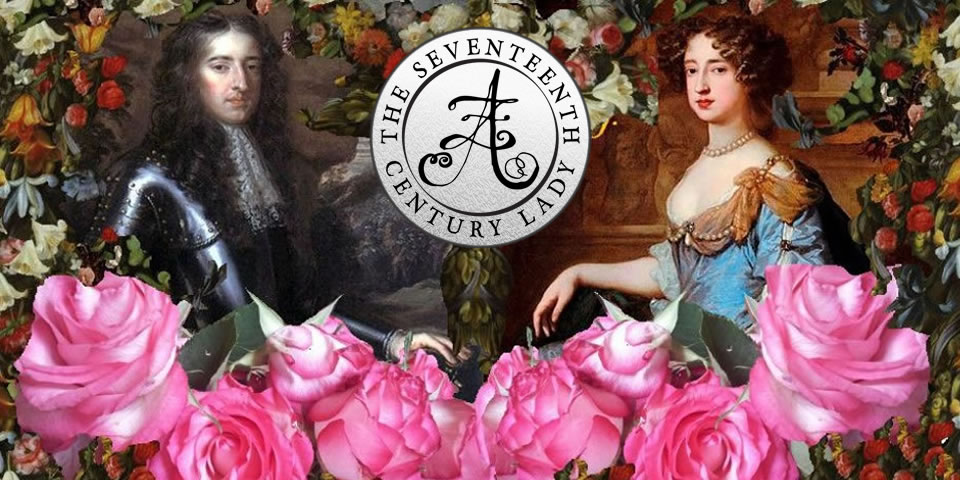Andrea Zuvich
26th April 2004

Veronica Franco, by Tintoretto
In the portrait by Tintoretto entitled: “Portrait of Woman – Veronica Franco,” one can hardly mistake the soft, sensual flesh that surrounds those two intelligent-looking eyes. The painting’s muse was indeed as intelligent and poetic as she was beautiful and fascinating. She was, arguably, the most talented of the courtesan-poets of her time, and yet, history has tried to replace her with other more “virtuous” women including Gaspara Stampa. Veronica Franco was truly the epitôme of the ideal Renaissance woman, for she was an “honest courtesan;” a great and powerful poetess; and always a true citizen of the Venetian Empire.
So who was the woman behind the alluringly passionate words? Veronica Franco was born in 1546, as the illegitimate daughter of well-known courtesan Paola Fracassa and a Venetian merchant by the name of Francesco Franco. From the day she was born, she had few options from which to choose. For example, a woman in her position could be: a wife, a scullery maid, a nun, or a courtesan. When she was a young teenager, Franco decided she wanted to be a god-fearing wife, but that situation did not work out, and she was forced to choose another way of life: to be a cortigiane. Courtesans were lucky in the respect that they had the freedom and the ability to read and write, and to discuss (and even influence) politics with the powerful noblemen of the Venetian courts.
With her great talent for words and her well-formed oratory skills, Franco soon had most Venetian men in love (or lust) with her. And thus, she became a cortigiane oneste, or and “honest” courtesan. This meant that “she achieved near-prominence through the sexual reconnections with nobles, intellectuals, and officials;” (World Eras 1) and “like Japanese geishas, courtesans were educated, sophisticated women whose exchanges with patrons were both intellectual and erotic” (Portrait 3). Her greatest supporter was found in Domenico Venier, patriarch of one of the most illustrious and powerful literary groups in the empire. He was the one who helped her get her works published, and also helped her later on during the Inquisition. But Venier was very important due to the fact that without his patronage of Franco, she would have completely disappeared from history and her brilliant voice would have been silenced as the women of her time were silenced.
Veronica Franco was one of the first female poets to be published. And she used this to her advantage by writing exquisitely; and making the men around her angry, uncomfortable, and aroused all at the same time. She always attributed her poems to her lovers, and to the Goddess of Love, Venus.
[“There the sea and shore sparkle,
with love, who, among Nereids and Sea Gods,
instills sweetness into those briny waters.Venus, encircled by other gods still,
descends from heaven to this beautiful shore,
in the company of the noble Graces…”-From ‘Poems in Terza Rima‘,]
She shocked the aristocratic women around her with her bold tongue and her uninhibited sexuality. According to Franco biographer Margaret F. Rosenthal, author of The Honest Courtesan: Veronica Franco, Citizen and Writer in Sixteenth-Century Venice, Veronica was thought vulgar and unchaste for “women who spoke their minds were deemed so” (8). Franco contributed a great deal to womankind with her writings, for she was one of the first women to be published, to write about the sufferings of women and children, and to declare that women have rights as well. She often would encourage women to become inquisitive like men:
[“When we too are armed and trained, we can convince men that we have hands, feet, and a heart like yours; and although we may be delicate and soft, some men who are delicate are also strong; and others, coarse and harsh, are cowards. Women have not yet realized this, for if they should decide to do so, they would be able to fight you until death; and to prove that I speak the truth, amongst so many women, I will be the first to act, setting an example for them to follow.” (Lettere Familari 1).]
Her first volume of poems, Terze Rime, was published in the year 1575. This volume contained many love sonnets, but one stands out in particular; Franco wrote a sonnet dedicated to the King of France, Henri III.
[“ I will show you my heart open in my breast,
Once you no longer hide yours from me,And my delight will be to please you;
And if you think I am so dear to Phoebus
For composing poems, in the works of love
You’ll find me dearer still to Venus…Know well, cruel man, the world will hear of it,
And, along with my sweet and bitter revenge,
Will carry the news of it to every place on earth.” (Terze Rime 2)].
The King’s lusty infatuation for her would ultimately help her city defeat its’ Turkish foe. In 1580, Franco (following the examples of other Renaissance writers) published a volume of 50 personal letters (the work is known as the Lettere Familiari) that she had written to people of importance.
On a personal note, the thing that fascinates me about Franco is how well she knows the intricacies of the male- vs. -female aspect of life. I admire the way she writes about her feelings without shame or apprehension, even though some of her poems are extremely erotic. How could a seemingly lowborn woman wield so much intellectual power? The answer is quite simple: she was a courtesan, and one who knew how to best use that power to her advantage. This spunk, if you will, totally sets her apart from the silent, submissive idea of a “good woman.” My absolute favourite poem of hers is the “When We Too Are Arm’d,” because she’s trying to rally us women to join together and follow her lead and becoming stronger, better people.
Venice in the late 1500’s was a beautiful, but decadent city. It had a great deal of territory, and so it was known as the Venetian Empire. This empire was a meeting-place for intellectual exchanges between the Eastern world and the western one, and in it flourished great literary society (Honest Courtesan). And in being an empire it did ,of course, have its share of run-ins with other empires, mainly the Turkish.
Franco loved her city dearly, so naturally when Venice needed aid she was one of the first to act. Venice needed a fleet of ships and the only one who could provide the necessary supplies was France, and who but the French King Henri III was the one who needed a little persuasion to give the ships? Veronica became the King’s mistress and in doing so, used her power and influence over him to give her nation what it needed to defend its’ borders from the imminent Turkish invasion.
But even victories do not come without tears. In the same year that she had her Terze Rime poems published, she was exiled and her home and fortunes robbed from her. Apparently Franco was exiled from 1575 to 1577, during the time when the Bubonic Plague threatened to destroy most of Europe. The religious fanatics took this pestilence as a sign from their god and so preached about how this was god’s punishment for the licentiousness of the courtesans and the utter depravity that was rooted deep in Venetian society. So, when Franco returned, she saw that courtesans were no longer the powerful creatures they once were. The new power was the Catholic Church, which was now questioning people for their devilish ways. When Franco was accused of witchcraft, she was brought before the court where she pleaded her innocence. She used her wit and defended herself brilliantly and she was cleared of all charges. The trial had its effect upon her reputation, she couldn’t make ends meet and to top it all off her patron Venier died leaving her with little income.
In conclusion, Veronica Franco was the treasure of Venice for she helped it when it was glorious in literature, decadent in its’ customs, and diseased with the Plague. Veronica Franco was a prostitute, an accomplished poet, and a hero for her people, and also one of the most fascinating characters to emerge from Renaissance Venice. Franco used sex to further the political and economic causes of her beloved home of gondolas, canals, and shining towers. She has touched us all in one way or another, for now there are new books about her life, and films such as “Dangerous Beauty,” – all of which shed new light into one of history’s most fascinating and talented people. And although she may have died in extreme poverty and grief, her inspiring works of poetry are still within the reach of those she wished to reach.

I have just discovered your very interesting and well documented contribution about Veronica Franco’s life. I was just amazed to read that “she was the daughter of another courtesan, Paola Fracassa”. Where did you find this name ? As the author of the novel ” MOI, VERONICA FRANCO, COURTISANE À VENISE ” (Clairsud 2007), I can assure you that this name is a pure personal invention (refering to the nickname “Capitaine Fracasse”! Did you read the novel? I would be glad to exchange with you about this fascinating woman (with a group of “Renaissance” musicians, we are preparing a concert with readings inspired from the novel).
With my best regards. MT
Hello Michele,
Thank you for taking time to comment on the entry. I wrote this particular entry five years ago and I have my notes somewhere but not to hand at the moment. However, I do recall I found this name, Paola Fracassa, in one of the books I used as my sources. I have neither read Capitaine Fracasse nor Moi, Veronica France, Courtisane a Venise – but I should like to very much. I would be more than happy to discuss the life of Signora Franco with you and your friends. I’m happy to know someone who has heard of her, frankly!
Also, a Renaissance concert inspired by the novel – how delightful! I do love music from Franco’s period and I think that that is a brilliant idea.
Thank you again, and I hope you have a lovely day!
Andrea Zuvich
I wonder if Montaigne and Veronia Franco ever met? Do you know if they did during his travels?
Love hearing about such a bold intellect of hers during those times. Women had little choice then as they were restricted from the libraries with exception of the Courtisanes. She did the best she could with the little that life gave her and more!
Mahalo, Thank you for your beautiful pages and insights into her life.
MauiJOY